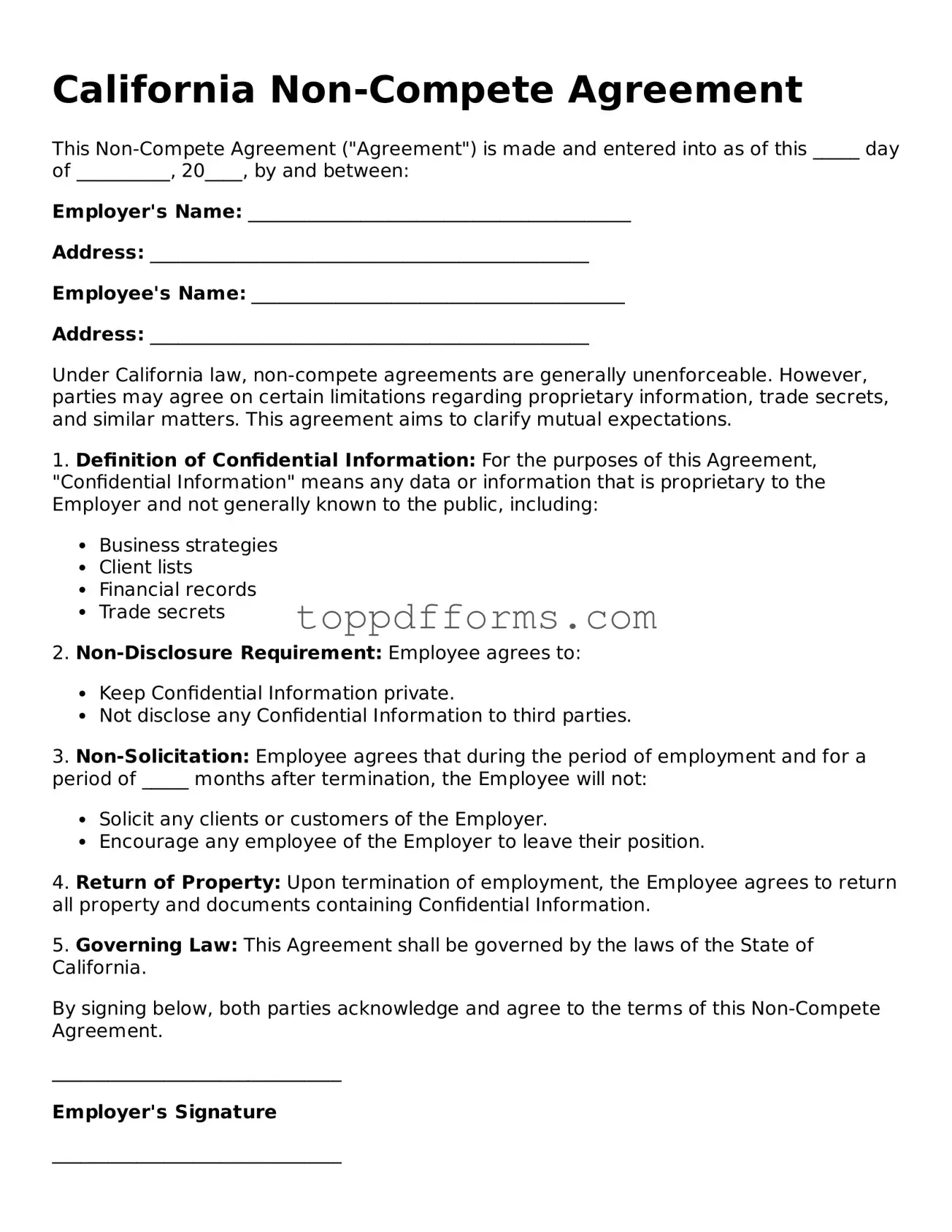Non-compete Agreement Document for California State
Things You Should Know About This Form
What is a California Non-compete Agreement?
A California Non-compete Agreement is a legal document that restricts an employee from engaging in certain activities that compete with their employer after leaving the company. However, it’s important to note that California law generally prohibits non-compete agreements, making them unenforceable in most situations.
Are non-compete agreements enforceable in California?
No, non-compete agreements are typically not enforceable in California. The state has a strong public policy favoring employee mobility and competition. This means that even if an employee signs a non-compete agreement, it is unlikely to hold up in court.
What are the exceptions to the non-compete rule in California?
While non-compete agreements are largely unenforceable, there are some exceptions. For instance, they may apply in the context of the sale of a business, where the seller agrees not to compete with the buyer. Another exception includes certain situations involving the protection of trade secrets.
What should I do if I am asked to sign a non-compete agreement?
If you are asked to sign a non-compete agreement, it is advisable to carefully review the document. Consider consulting with a legal professional to understand your rights and the implications of signing such an agreement, especially since they are generally not enforceable in California.
Can my employer take legal action against me if I violate a non-compete agreement?
Given that non-compete agreements are generally unenforceable in California, your employer may have limited options for legal action. However, if the agreement pertains to trade secrets or other protected interests, they may pursue legal remedies under different legal theories.
What is the purpose of a non-compete agreement?
The primary purpose of a non-compete agreement is to protect a company’s business interests. Employers seek to prevent former employees from using confidential information or trade secrets to gain a competitive advantage in the same industry.
How can I protect my interests if I am leaving a job?
If you are leaving a job and are concerned about protecting your interests, consider discussing your situation with a legal expert. They can provide guidance on how to navigate any potential agreements and ensure that you are not inadvertently violating any terms that could affect your future employment.
Are there any alternatives to non-compete agreements?
Yes, there are alternatives to non-compete agreements that employers can use. Non-solicitation agreements and confidentiality agreements are common alternatives. These agreements can protect a company’s interests without restricting an employee’s ability to find new work in their field.
PDF Overview
| Fact Name | Description |
|---|---|
| Non-Enforceability | In California, non-compete agreements are generally not enforceable, except in limited circumstances. |
| Business Protection | Employers may use non-solicitation clauses to protect their business interests without violating California law. |
| Governing Law | California Business and Professions Code Section 16600 governs non-compete agreements. |
| Exceptions | Non-compete agreements may be enforceable in cases of the sale of a business or partnership dissolution. |
Common mistakes
When it comes to filling out the California Non-compete Agreement form, many people stumble into common pitfalls that can lead to misunderstandings or even legal issues down the line. One of the most frequent mistakes is not fully understanding the purpose of the agreement. A non-compete agreement is designed to protect a business's interests by restricting an employee's ability to work for competitors after leaving the company. However, in California, these agreements are largely unenforceable, so it’s essential to know what you’re getting into.
Another mistake often made is failing to specify the duration of the non-compete clause. While some may think that a vague timeframe will suffice, this can lead to complications. Without a clear duration, the agreement may be deemed unreasonable, which can render it ineffective. A well-defined timeframe helps both parties understand the limits and expectations involved.
Many individuals also overlook the importance of geographical scope. It’s crucial to clearly outline the areas where the non-compete applies. A common error is making the geographical restrictions too broad. This can not only be seen as unreasonable but also unenforceable in a court of law. Keeping the scope limited to specific regions where the business operates can help maintain the agreement’s validity.
Another frequent oversight is neglecting to include consideration. In legal terms, consideration refers to something of value that is exchanged between parties. If an employee is asked to sign a non-compete agreement without receiving any form of compensation or benefit in return, the agreement may be challenged. It’s important to ensure that there is a clear exchange of value to make the agreement binding.
People often rush through the signing process, failing to read the entire document thoroughly. This haste can lead to signing an agreement that contains terms or conditions that are not fully understood. Taking the time to review each section carefully can prevent future disputes and ensure that all parties are on the same page.
Lastly, many individuals forget to consult with a legal professional before finalizing the agreement. While it may seem like an unnecessary step, having an expert review the document can provide invaluable insights. Legal professionals can identify potential issues and help clarify terms that may be confusing. This proactive approach can save time, money, and stress in the long run.
Other Common State-specific Non-compete Agreement Forms
Confidentiality and Non Compete Agreement Template - This type of agreement can contribute to an ethical business environment.
Completing the Texas Motorcycle Bill of Sale form is essential for anyone looking to buy or sell a motorcycle in Texas, as it not only facilitates the ownership transfer but also serves as a legal safeguard for both parties involved. You can find a convenient template for this important document by visiting PDF Templates, ensuring that all necessary information is accurately recorded for a successful transaction.
New York Non Compete Law 2023 - Companies may need to offer compensation for the restrictions placed on the employee.
